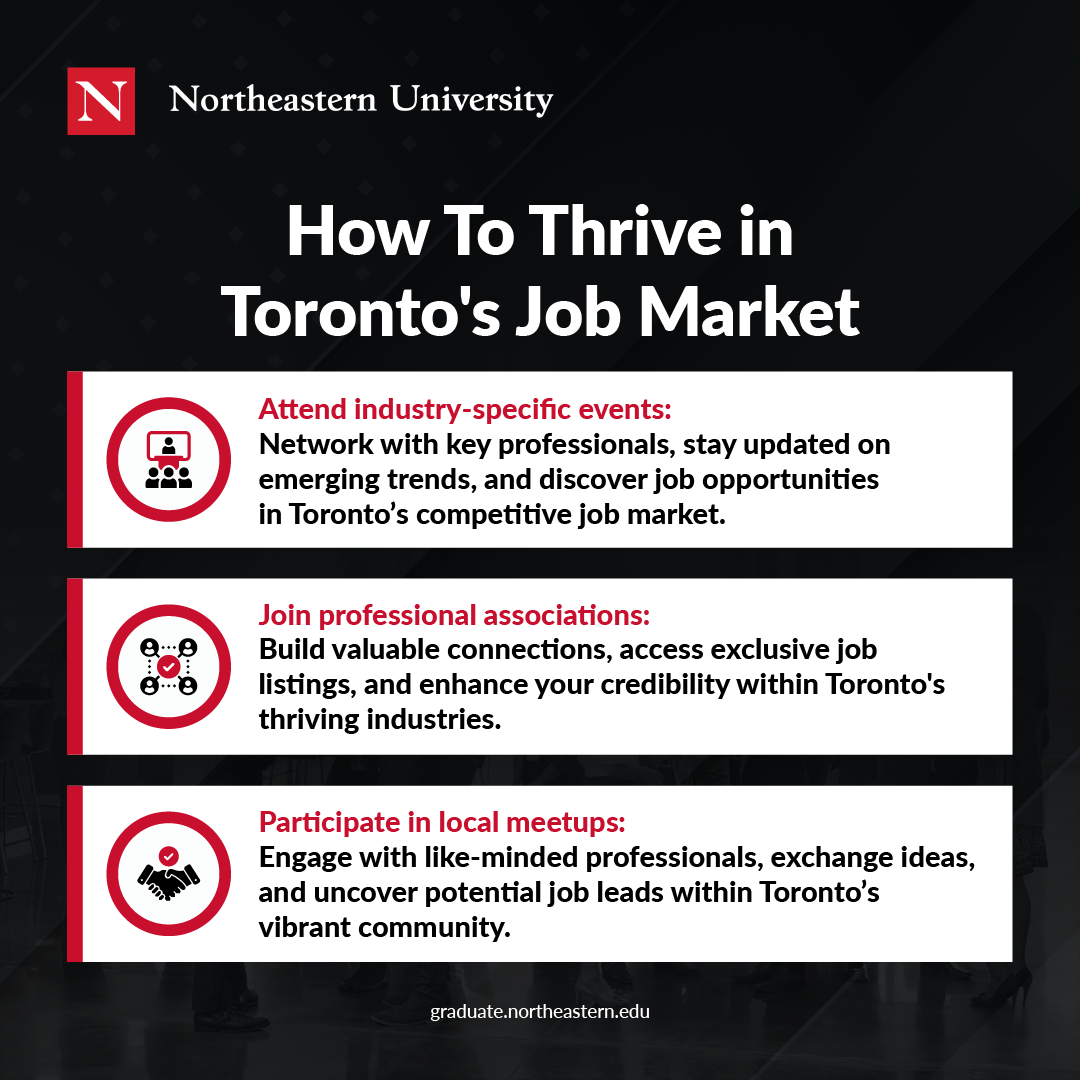
Working in Toronto: Job Market and Cost of Living Insights
October 1, 2024
Learn more about living and working in Toronto, and how to set yourself up for success in the thriving, competitive job market.

By Shayna Joubert
September 16, 2024
The Canadian economy has seen a lot of growth in recent years, and it’s expected to continue. According to OECD, Canada’s labor market is projected to continue to grow over the next two years with total employment forecast to grow by 1.5% in 2024 and 2025. Even as this expansion has begun to moderate, certain provinces and regions continue to act as economic powerhouses. The Toronto region is one of them.
As the largest city in Canada, it’s little wonder that Toronto has seen much of this growth. The city itself is home to more than 2.8 million people. Roughly 47% of that population has immigrant status of some kind, making Toronto one of the most diverse cities in the world. This means the city has a vast number of people from different backgrounds and with different skills—an employer’s dream, which has helped Toronto become a leader in a number of industries.
To succeed in Toronto’s high-paying industries, professionals should focus on continuously improving their skills and expanding their professional networks while searching for career opportunities in Toronto.
Networking remains a crucial aspect of career advancement. Attending industry-specific events, joining professional associations, and participating in local meetups can provide valuable connections and insights. Additionally, embracing continued education can significantly enhance your qualifications and appeal to top employers.

Effectively navigating the job market also involves staying updated on industry trends and tailoring your resumé and cover letter to showcase the specific skills and experiences sought by employers for in-demand industries and sectors.
Below, we will explore some of the most important industries, sectors, and career paths in Toronto and offer some tips to help you land top-paying jobs in Toronto.
Toronto is now considered the third-largest tech talent pool in North America, ranking just behind San Francisco and New York. As such, Toronto has attracted many big-name technology companies that need this global talent to thrive.
While the bulk of these jobs are in computer systems design and related services (60.2 %), other important subsectors include telecommunications (21.2%), computer and electronic product manufacturing (7%), information services (5.5 %), software publishing (3%), electronic and precision equipment manufacturing (1.6%), and internet service providers and data processing services (1.5%).
Some of the highest-paying tech jobs in the Toronto area include:
While high demand for tech talent is a good thing for job seekers, it also makes for increased competition for the highest-paying jobs. For this reason, it’s critical to continuously expand your skill set in order to advance your career. Earning an advanced degree like a Master of Science in Cybersecurity, Computer Science, or Analytics can help you to develop the skills and experience that employers want and need.
In addition to being one of Canada’s preeminent tech hubs, Toronto is also the second-largest financial center in the country after New York, employing almost 270,000 workers. Many of the country’s largest financial institutions have chosen the city as home, including the Canadian Imperial Bank of Commerce, Royal Bank of Canada, Manulife Financial, Sun Life Financial, Aviva Canada, and many of the country’s largest pension funds.
Many of the available jobs are concentrated in the banking services industry (58.3%), but other important finance and business-related sub-sectors that are actively hiring include securities and investments (22.5%), insurance (17.7%), and various other funds (1.5%).
Some of the highest-paying (non-executive) business and finance jobs in the Toronto area include:
If your goal is to work in business or finance in the Toronto area, it pays to be able to differentiate yourself from others in the industry. Earning an advanced degree that speaks to a unique skill set, such as a Master of Science in Project Management, Business Analytics, Cybersecurity, or Leadership, can help highlight the value that you would bring to an organization and increase the likelihood of landing one of these more advanced, competitive positions.
Toronto is home to a healthy and thriving life sciences industry. With nearly 30,000 workers and dozens of influential companies—including Eli Lilly, Johnson & Johnson, Janssen, McDougall Scientific, Thornhill Medical, and more—the industry contributes more than $2 billion to Toronto’s economy.
As an industry, life sciences is particularly broad. In Toronto, the majority of open roles are split amongst the following subsectors: Paid researchers in hospitals (32.3%), pharmaceuticals manufacturing (20.5 percent), medical and diagnostic services (17.3%), research and development (8.8%), pharmaceuticals and pharmacy supply (7.9%), medical instruments manufacturing (6.8%), and medical equipment and supplies manufacturing (6.4%).
Some of the highest-paying jobs in the Toronto life sciences industry include:
Many of these positions, especially the research-focused ones, will naturally require job hunters to earn an advanced technical degree that demonstrates expertise in a particular domain. Which degree is required will depend on the job, but ones that may increase the likelihood of landing a role in the life sciences industry include a Master of Science in Biotechnology, Bioinformatics, and Health Informatics.
It is important to note, though, that not all jobs in the industry require technical degrees. If you’re interested in pursuing a support role—for example, as a regulatory affairs professional or product specialist—a degree such as a Master of Science in Regulatory Affairs or Project Management may help you demonstrate the nontechnical skills and expertise you’ll need to succeed in such a capacity.
If you live in the Toronto area and want to land a well-paying job or advance in your career, Northeastern University in Toronto offers specialized academic programs designed to help you reach your goals. These programs combine rigorous academic coursework with hands-on learning opportunities to bridge the gap between theory and practice. Our faculty members are not only educators but also experienced industry professionals, providing relevant mentorship tailored to the demands of the market.
By integrating challenging academics, experiential learning, and industry-experienced faculty, these programs are specifically designed to meet the needs of businesses in the Toronto area. This comprehensive educational approach not only enhances your skills but also prepares you to tackle the real-world challenges of the future job market. As industries evolve and new technologies emerge, having up-to-date knowledge and skills is crucial.
Take a look at the online and hybrid programs available at Northeastern’s Toronto campus.
Take a look at the online and hybrid programs available at Northeastern’s Toronto campus.

October 1, 2024
Learn more about living and working in Toronto, and how to set yourself up for success in the thriving, competitive job market.

July 30, 2024
With a high demand for skilled professionals, here’s what you can do to distinguish your experience from others’ in the Toronto job market.

September 13, 2017
From boosting your salary to gaining more specialized skills, here are the top reasons to earn your graduate degree.